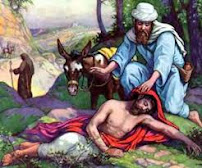The first sentence of the passage caught my attention: “Beloved, wait for and hasten the coming of the day of God.” (2 Pet. 3:12)
The translation formerly used at mass was“wait earnestly for the coming of the Lord" instead of "hasten the day of the Lord."
This discrepancy between the two translations sent me to my Greek lexicon for some clarification. What I found made me sit up and take notice. That's why I'm sharing it with you,
The verb in question is speudo. Its first meaning is “hurry.” You may remember in the first chapter of Luke, after the annunciation, Mary goes “in haste” to visit your kinswoman Elizabeth. That noun ” haste“ is from the same root.Some extended meanings given in the lexicon for speudo include the notion of “eagerness,” which is what the former lectionary brought out by telling us to be eager for the coming of the day of the Lord
But there is good reason to prefer the first meaning, "to hurry" with a direct object such as to hurry someone along. If we do so, we find some challenging translations such as:
“Making the day of God come soon.“
"Hastening the day of God.”
One scholar even suggests:
“Doing your best to cause the kingdom.“
The question that arises naturally is this: “How can I cause the day of God to come soon?“
First, we should understand that “the day of the Lord,” refers to the final coming of the “kingdom of God.” And what is this kingdom, this reign of God? Where is it? My favorite image of the kingdom comes from Jesus himself, "The kingdom of God is among you," or, better, "the kingdom of God is between you” (Lk 17:20)" The kingdom exists in the spaces between us, in our relationships with one another.

It is in our relationships with one another that the kingdom exists. For me, this means my way of relating with each of my brother monks, with each of my students, etc. Am I doing my share to make the kingdom a reality right now by the way I relate to those around me, by the way I love other people?
So, when Peter writes “Beloved, wait for and hasten the coming of the day of God,” he is not saying "Sit around and wait for the coming of the day of God," but rather "Be about the task of loving one another, which builds the kingdom and thus brings us all closer to the final coming of Jesus."




I find it interesting that you use a lexicon and study from the original languages. I would love to serve God in a church but unfortunately I have not found one denomination teaching the truth of scripture. I've spent years studying from the Hebrew and Greek and if "speudo" caught your attention, how do you feel when he calls "them" a "Generation" of vipers? Generation from the Greek Genea meaning race/family? If you do study from the Greek and Hebrew, do you know the full truth? Who Israel actually is? Who the children of Satan are as explained in gen 3:15 which is the entire theme of scripture and what we are facing in this world? Do you not know or do you just keep this information to yourself? Thanks John B nationofchrists@gmail.com
ReplyDelete